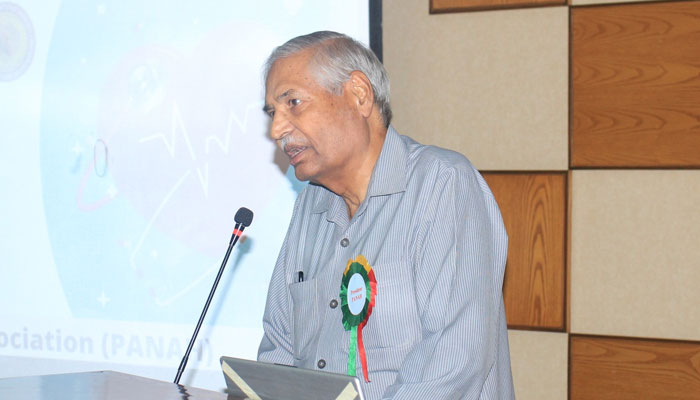Government’s role in ensuring access to healthy food stressed
Islamabad:On the occasion of World Food Day, President Pakistan National Heart Association (PANAH) Major General (r) Masud Ur Rehman Kiani underscored the critical role of the government in making healthy food accessible to all.
He highlighted alarming health statistics, saying, “Pakistan is facing a health crisis, with 33 million diabetics and another 10 million on the brink of the disease, as reported by the International Diabetes Federation. Obesity is surging, hypertension is rampant, and these preventable conditions are becoming part of everyday life.”
The president PANAH called for urgent collective action to change harmful eating habits, starting at the individual level. He stressed the need to embrace healthier choices. “We must focus on home-cooked meals, reduce our intake of salt, sugar, and oil, opt for water over sugary drinks, and prioritize fresh, unprocessed foods,” he added. Munawar Hussain, Country Coordinator for Global Health Advocacy Incubator, warned that Pakistan’s food and health landscape is dire. He cited the increasing prevalence of non-communicable diseases (NCDs) linked to the widespread consumption of ultra-processed products (UPPs). Over 41% of adults in Pakistan are overweight or obese, with more than 33 million living with diabetes. If immediate policy action is not taken, this number will escalate to 62 million by 204, he said.
Hussain emphasized that UPPs, loaded with excessive sugar, salt, and trans-fats, are a major cause of NCDs. He urged the government to take decisive action, including raising taxes on these harmful products and introducing mandatory front-of-pack warning labels. “These measures have proven effective globally and are essential to reduce consumption of unhealthy foods in Pakistan.”
Sana Ullah Ghumman, General Secretary PANAH, echoing the theme of World Food Day 2024, “Right to Food for a Better Life and a Better Future,” called for stronger government regulations. “The government must lead the charge in addressing the food crisis with stronger policies, including clear front-of-pack warning labels on unhealthy foods and public health campaigns to raise awareness,” he said.
He further called for an increase in taxes on ultra-processed products, stressing that these non-essential items not only deteriorate public health but also strain the healthcare system. “Taxing UPPs will yield triple benefits: enhanced government revenue, reduced healthcare costs and a healthier population.” In the light of the current fiscal challenges, where the government is exploring options to address tax shortfalls, Ghumman suggested that taxing unhealthy products in the upcoming supplementary finance bill could both increase revenue and relieve the national health burden.
-
 Chinese New Year Explained: All You Need To Know About The Year Of The Horse
Chinese New Year Explained: All You Need To Know About The Year Of The Horse -
 Canadian Passport Holders Can Now Travel To China Visa-free: Here's How
Canadian Passport Holders Can Now Travel To China Visa-free: Here's How -
 Glen Powell Reveals Wild Prank That Left Sister Hunting Jail Cells
Glen Powell Reveals Wild Prank That Left Sister Hunting Jail Cells -
 Edmonton Weather Warning: Up To 30 Cm Of Snow Possible In Parts Of Alberta
Edmonton Weather Warning: Up To 30 Cm Of Snow Possible In Parts Of Alberta -
 'A Knight Of The Seven Kingdoms' Episode 5: What Time It Airs And Where To Stream
'A Knight Of The Seven Kingdoms' Episode 5: What Time It Airs And Where To Stream -
 Amy Schumer Drops Cryptic Message On First Valentine Amid Divorce
Amy Schumer Drops Cryptic Message On First Valentine Amid Divorce -
 Savannah Guthrie Sends Desperate Plea To Mom Nancy Kidnapper
Savannah Guthrie Sends Desperate Plea To Mom Nancy Kidnapper -
 NBA All-Star 2026 Shake-up: Inside The New USA Vs World Tournament Format
NBA All-Star 2026 Shake-up: Inside The New USA Vs World Tournament Format -
 Warner Bros Consider Reopening Deal Talks With Paramount, Says Reports
Warner Bros Consider Reopening Deal Talks With Paramount, Says Reports -
 Andrew Mountbatten Windsor Faces Future With UK MPs, Says Expert
Andrew Mountbatten Windsor Faces Future With UK MPs, Says Expert -
 Eva Mendes Shared Bedroom Photos For Ryan Gosling On Valentine’s
Eva Mendes Shared Bedroom Photos For Ryan Gosling On Valentine’s -
 Shamed Andrew Told 'nobody Is Above The Law' Amid Harrowing Silence
Shamed Andrew Told 'nobody Is Above The Law' Amid Harrowing Silence -
 Gisele Bundchen Melts Hearts With Sweet Bike Ride Glimpse Featuring Son
Gisele Bundchen Melts Hearts With Sweet Bike Ride Glimpse Featuring Son -
 Prince William Found Meghan Markle ‘quite Refreshing’ At Start
Prince William Found Meghan Markle ‘quite Refreshing’ At Start -
 Kate Middleton Knew Should Could Not Be ‘voice Of Reason’ With Prince Harry
Kate Middleton Knew Should Could Not Be ‘voice Of Reason’ With Prince Harry -
 Rihanna Has Wardrobe Malfunction At A$AP Rocky Fashion Show
Rihanna Has Wardrobe Malfunction At A$AP Rocky Fashion Show




